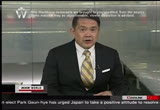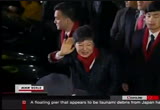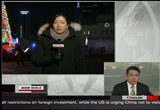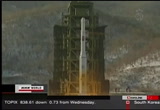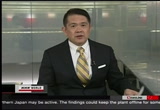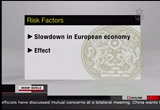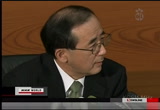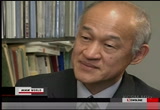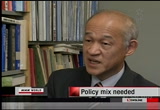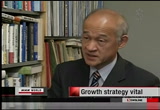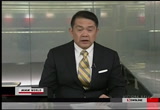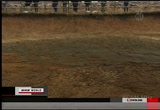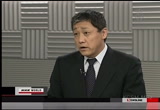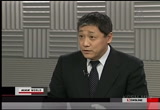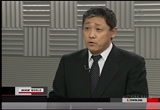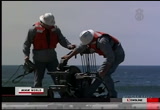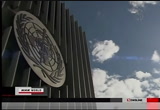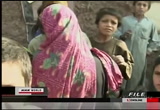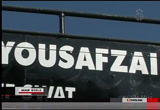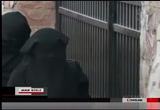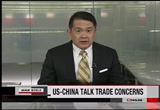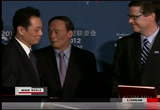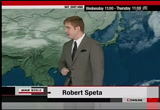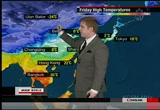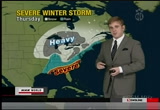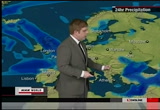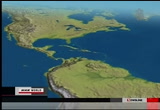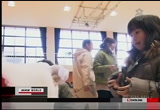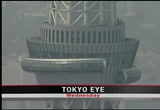tv Newsline 30min KCSMMHZ December 20, 2012 6:00am-6:30am PST
6:00 am
south koreans are getting used to the idea of their first female leader. park geun-hye starts laying out her plans a day after she won the presidential election. policymakers and japan's central bank have injected another shot of stimulus into the economy. they're facing pressure from the incoming japanese leader. welcome to nhk world "newsline." park geun-hye made a lot of promises during her election campaign. she said she would make life better for south koreans. now the pressure for her to keep
6:01 am
those promises is on. people across the country are watching the president-elect closely and analyzing her victory. earlier i spoke with a reporter in seoul on the day after the election. >> reporter: the south korean media are busy telling park geun-hye's history, they're going over the twists and turns of the path that led to the start of a late president back to the blue house as president. experts say the high voter turnout helps park win more than 50% of the ballots. some initially thought it would have favored opposition candidate moon jae-in who has widespread support among young people. in past presidential elections, voters in their 30s or younger outnumbered those in their 50s or older. this time around the reverse happened within perhaps because society is aging and birth rates
6:02 am
are declining. the 50-plus set accounted for more than 40% of all voters. and they propelled park into the top job. park visited the national cemetery the day after her election win as all president-elects do. then she outlined the plans. >> translator: my dream and hope is to make use of all the hidden potential of the south korean people. we can create a republic of korea in which everyone will be guaranteed the right to pursue happiness. i'll make it possible for all the people to share the fruits of our economic growth. >> what are voters saying about park now that she's going to be their next president? >> reporter: they've heard her make promise after promise like she made thursday and throughout her campaign. they want her to improve the economy and narrow the widening gap between the rich and poor.
6:03 am
>> translator: i expect the new president to revive the economy and keep her promise to improve our lives. >> translator: i hope the new government will do a lot to boost employment since it's been a tough time for young people. i want park to keep her promises. >> kaho, every south korean president takes office with a big north korea file on their desk. it's a difficult issue. what stance will park take toward her neighbor? >> reporter: she needs to balance competing visions. some south koreans want to be tough with the north. others favor reconciliation. park says it is her mission to ease tensions and maintain security. she refers to last week's launch, which north korean officials said used a rocket to send a satellite into orbit and other nations called a ballistic missile test.
6:04 am
>> translator: north korea's missile launch was a symbolic act that showed us how serious our security situation is. we will begin a new era for our country with a strong security system and trusted foreign policy. i will keep my promise to the people. >> reporter: park spent part of this day exchanging views with ambassadors from japan, the u.s., china and russia. she has already started moving to form her government. she'll meet with members of the present administration to go over issues. a transfer commission will finalize her policies. then in february she'll officially become the first woman in south korea to be president. voters in south korea thought about the power of conglomerates when they cast ballots. many are frustrated that the big
6:05 am
business blocks are elbowing out small and medium-size companies. they want their next president to level the playing field. we'll take a more in-depth look into that issue on friday. japan's next leader has been dialing up the pressure on central bankers. he says they need to do more to shore up the economy. officials at the bank of japan emerged from two days of meeting and agreed to pump money into the economy for the fifth time this year. policymakers decided to add 10 trillion yen or $120 billion to the bank's asset-buying program. they plan to add $60 billion to buy up long-term government bonds. they will spend another $60 billion on short-term bonds. the move will provide more liquidity to financial markets. policymakers downgraded their assessment of the economy. in their words, it is weakening further. they cited a drop in industrial output and exports due to the slowdown in europe and soured relations between japan and
6:06 am
china. they also referred to the bank's latest tankan survey, showing business sentiment among major manufacturers falling to the worst level in almost three years. incoming leader shinzo abe met bank of japan governor on tuesday. he said he wants to set an inflation target of 2%. policy makers decided to discuss the inflation target in their next meeting scheduled for next month. after the meeting shirakawa stressed the board members will discuss at length abe's demands. >> translator: we will spend the next month preparing for the discussions. i hope we will reach a conclusion at the next policy meeting in january. there is no final decision at this point. >> abe gave a cautious comment on the bank of japan's decision. >> translator: the central bank
6:07 am
is putting into practice one by one what we campaigned for in the lower house election. i hope to see a good outcome from these moves before the upcoming upper house election. we work hard so people won't vote against our party as they did to the democratic party in the recent general election. >> abe may not be completely satisfied with the boj's decision. apparently he thinks the central bank can do more. nhk world's raiko asked the professor at a university for his insight on what the boj might decide in the near future and what the economic challenges are for the incoming administration. >> reporter: they think the bank of japan might act more aggressively, such as setting an inflation target in the upcoming meetings. that's just what the new political leader abe is asking for, but he warns that it might not be a silver bullet to cure the economy when the country has such a huge debt.
6:08 am
>> the board is instructing the staff to come up with a new inflation target, to say inflation framework for the policy. so they may change the current framework of the inflation objectives. to say 2%. that's a possibility. at the same time, it may have a side effect. long-term interest rates may rise because people expect the inflation rate tends to be higher in the long run. >> reporter: he thinks that a balanced and well thought out action plan is necessary to get out of deflation. >> we have to get out, but in order to get out you have to raise taxes. also, avoiding the weak economy. so you have to have the right policy mix to gradually increase
6:09 am
taxes and at the same time, use part of the revenue to stimulate the economy. but the net effect has to be declining budget deficit. so you need this policy mix, increasing taxes and then use part of tax to stimulate the economy, but cut the budget deficit. that is a very delicate balance. >> reporter: are there other growth strategies that the administration can do? >> they can increase the growth of the japanese economy, the growth rate of the japanese economy, we have to increase the population, working age population. now working age population is declining by about 1% per year. so even if we can achieve more productivity growth higher than the united states.
6:10 am
achievable trend growth rate is only 0.5%. you have to increase the growth rate to stimulate the economy, we have to get more migration. thousands of people waiting to go home. tons of debris, waiting for disposal. vast tracks of land waiting to be restored. overcoming the challenges of japan's 2011 disaster won't be easyhe'easy but step-by-step, p going forward, find out on "the road ahead" every wednesday at 1:00 p.m. japan time right here on "newsline." experts are looking at their surveys of the country's power plants and they don't like what they see. they've been checking the ground
6:11 am
beneath a handful of facilities for signs of earthquake vulnerability. they say active seismic faults could run beneath part of a plant in north japan. nra met to evaluate the results of a survey they carried out this month at the higashidori nuclear plant. they said they can't accept the operator's contention that groundwater caused a shift in the layers of the earth. the experts will hear from representatives of the electric company next week and then reach their conclusion. the operator won't have to scrap the reactors even if the nra determines the faults are active. no key facilities sit on the faults. but the utility will have to review the plant's earthquake resistant measures which could delay the resumption of operations. >> translator: the projected earthquake movement will be quite different since the
6:12 am
present projection does not consider the existence of active faults in the compound. earlier i spoke with a reporter for his insight. these plants have been operating for quite a number of years. why are we only learning of these issues today? >> people in japan have been concerned about the stability of the earth beneath nuclear plants since the quake and tsunami last year triggered the accident in fukushima. teams with regulators that preceded the nra inspected the cracks under nine plants. the inspector involving that probe said regulators didn't have clear evidence so they couldn't say the cracks are active faults. but the situation has changed since the government launched the nra. the nra's chair believes faults should be judged as active if inspectors have enough evidence to raise doubts about the stability. >> now, how widespread are these inspections?
6:13 am
>> yes, gene, nra is looking at 6 of japan's 17 commercial nuclear plants and one major testing nuclear plant. nra's chair says all of them should be checked. higashidori is the third one to come under question. nra inspectors looked at the ohi plant in central japan. they ordered its operator to conduct an additional probe saying cracks below the plant could be active faults. the inspectors then turned their attention to another plant which is close to ohi. they concluded cracks beneath it are highly likely active faults, and that one of them runs right below a reactor. >> what happens once they make that conclusion? >> that's a great question. japanese law prohibits the key nuclear facilities on faults so in theory, the two plants should be scrapped.
6:14 am
but plant operator dispute that conclusion. the problem is, there are no laws or guidelines dictating the process for shutting down the reactors that sit on active faults. existing law states it's up to plant operators to decide whether or not to scrap the reactors. 48 of japan's 50 commercial reactors are offline right now. the ongoing democratic party-like government said it wouldn't allow units determined unsafe by the nra to restart. but that's just a temporary policy. so things could change when the liberal democrats take over later this month. >> all right. where does that leave the nuclear regulatory authority? >> nra representatives tell us they only have the power to inspect and make reports and recommendations. they're revising their regulations right now. they're focusing on whether the standard clearly states any
6:15 am
plants found to sit on active faults should be scrapped. and whether the government has the power to decide to shut down a facility found to be unsafe. a fleeting pier has been washed ashore in the u.s. state of washington. apparently having drifted from japan after the massive tsunami hit the country in march of last year. a u.s. coast guard helicopter spotted the nine-meter concrete pier on the shore of the olympic peninsula. bad weather has prevented a close study. no signs or letters have been confirmed on the pier. a floating pier from japan's northeastern prefecture was found on the oregon coast in june. it was later demolished by the state government. japan's environment ministry says ocean currents are likely to deliver 33,000 tons of tsunami debris to the pacific coast of north america by june of next year. international organizations are denouncing a tax on health
6:16 am
workers in pakistan this week. the violence put a halt to vaccine work in the country. our reporter in bangkok has more. gunmen shot and killed 12 members of polio vaccination teams in separate incidents around pakistan this week. the united nations is protecting staff members in the country by taking them off duty. the u.n. has responded to the attacks. >> the killing of health workers in pakistan were cruel, senseless and inexcusable acts that i condemn in the strongest of terms. those killed were among thousands across pakistan, especially women who are working selflessly. >> the world health organization is also speaking out against the violence, saying it is depriving the population of potentially life-saving health care.
6:17 am
>> irrespective of the circumstances of the situation, attacks on health workers, health facilities or health services are completely unacceptable. >> women health workers held protests in the southern city of karachi and in the capital islamabad. they are demanding that authorities provide them with protection to accomplish their goal of ending polio. pakistan is one of only three countries in the world where the disease is still endemic. it is not yet known who is behind the multiple attacks. the pakistani taliban has long opposed vaccinations saying they are a plot to sterilize muslims. however, they have spoken out against such myths. there are also accusations that immunization campaigns are cover for spies. following the death of osama bin laden it emerged that the united states had used a pakistani medical team to gather intelligence on the al qaeda leader. the shooting of pakistani teenager an outspoken advocate
6:18 am
of women's right to education has received global attention. her courage inspired many. attacks by muslim militants continue as does public anxiety. many are fearful for showing support for the shooting victim. nhk world reports. >> reporter: the 15-year-old student was shot by the pakistani taliban in october after championing girls rights to education. she was critically wounded but is currently recovering in a foreign medical treatment in england. malala is from northwestern pakistan, a women's junior college in the region named themselves after the teenager shortly after the shooting. the name change was to emphasize the importance of women's education. but students have held massive protests at the school this month.
6:19 am
they say the new name increases their risk of militant attacks. college officials decided this week to reinstate the college's former name for the time being. the school officials want to consult with local authorities about what to do next. following the shooting in october, the pakistani government was ready to work harder to improve women's education in the country. it has also called for international support to achieve its goal. muslim insurgents are attacking schools in northwestern pakistan. many girls go to school fearing they will be targeted next. >> and that wraps up our bulletin for today. i'm cholaphansa narula in bangkok.
6:20 am
chinese police are arresting cult members for spreading doomsday rumors and the country's media is busy refuting the idea that world will end on friday, december 21st. the people's daily reported that rumors have no scientific basis. the beijing times said on the weather page that a strong cold snapple grip the country over the weekend but that this has nothing to do with the world ending. u.s. and chinese trade officials discussed mutual concerns at a high level bilateral meeting held annually. china wants the u.s. to stop restrictions on foreign investments and the u.s. is urging china not to violate intellectual property rights.
6:21 am
the trade issues were discussed at the 23rd session at the u.s. joint session in washington. u.s. trade representative ron kirk and chinese vice premier were among those at the two-day meeting that ended on wednesday. at a news conference after the meeting, officials from china pointed out that the u.s. is blocking chinese investments in the country due to national security. they said they will watch how the u.s. addresses the issue. but asked for modifications. kirk said a major advance was made in the meeting, but u.s. officials addressed concerns about widespread piracy and counterfeit software in china. officials said they will check in china takes measures to improve its intellectual property protection. this is the first trade meeting after president barack obama was re-elected for a second term and ping succeeding as the new communist party leader. japanese government
6:22 am
officials have asked counterparts to have intergovernmental talks. that's on china's extra tariffs on the imports of steel tubes from japan. japan argue that's china imposed anti-docking tariffs on a seamless stain else steel tubes without prior explanation to japan in violation of world trade organization rules. the tubes are widely used at power stations. the two governments are expected to hold talks soon. if they fail to reach an agreement within 60 days, japan will ask the world trade organization to set up a panel to handle the dispute. the japanese officials say they hope the move will discourage china from imposing extra duties on other imports from japan. warmer temperatures ahead. our meteorologist is here with the details. robert? >> well, things are clearing up much across japan now, actually. the light showers here along the east coast really are just from this instability on the west coast rain. now moving over the mountains and really most of the snowfall
6:23 am
icing here near hokkaido. that will taper off into friday. this high pressure is pushing to the east. tracking sunny skies across much of japan. some the higher elevations where you see the exhibit snowfaconsi, there is a risk of avalanche. as it goes into saturday evening and into sunday, that's going to start to change back over to snow. then that influx of cold air coming out of siberia towards the northwest, that's really going to drop the temperatures back down again going into monday. a quick warmup over the weekend. it doesn't look like it will be lasting very long. where this cold air is coming from is northeastern china. mongolia, minus 24 for your high. your low, minus 27. beijing down to the minus 5 mark. to the tropics.
6:24 am
raining, rather warm for you. mani manila, only getting to 22. you are seeing some heavy rainfall in areas that were absolutely devastated by a typhoon three weeks ago. continue to watch that here. now let's take a look to the meshgz a americas. you can see on the satellite picture that comma shape popping up here. that's indicating very strong, rather potent system attached to it. this cold front already producing several tornado warnings across this area, especially over towards alabama. we're watching this system work its way towards the east. that's going to be bringing some more severe weather around portions of the carolinas, even into georgia. north of that, seeing some rain. but then once you get into the appalachians, that is changing over to heavy snow. even in organizatiportions of t lakes, cold air pushing from the north. that will bring the lake-effect snow machine on tap for you going into your weekend
6:25 am
especially. mean while, let's take a look at the other side of the country here into the western u.s., even western canada. a pacific storm system is pushing on shore here. gusty winds even in northern california and higher elevations, you could be seeing upwards of hun h00 centimeters snowfall. that continues to push on shore accompanied by the cold temperatures. vancouver and seattle getting to the high single digits. los angeles on the other hand at 18 on thursday. let's take a look towards europe. a series systems still impacting the british isles. we're continuing to see heavy rainfall on thursday going into friday due to this widespread system pushing through here. take a look at the other side of the continent here, especially on to turkey. you've been seeing a very strong storm system. and this one has been bringing absolutely gusty winds. upwards of 60 to 80 miles per hour. and already been reported widespread heavy rain.
6:26 am
even snowfall north involved in northern turkey. that's starting to weaken now. early next week, another system is going to develop starting to push through here yet again. mild temperatures in the west. london and paris at 8 and 9. look to the south, madrid at 14. here's a look at your extended forecast.
6:27 am
we'll end our program with news of an early christmas present by a high flying santa claus in a helicopter. santa dropped in on an elementary school in northeast japan on thursday. he brought with him gifts for children who went through last year's earthquake and tsunami. a volunteer group from west japan organized the event to cheer up the students there. needless to say, their efforts and santa's sack full of s was a treat for the kids.
6:28 am
205 Views
IN COLLECTIONS
KCSMMHZ Television Archive
Television Archive  Television Archive News Search Service
Television Archive News Search Service 
Uploaded by TV Archive on

 Live Music Archive
Live Music Archive Librivox Free Audio
Librivox Free Audio Metropolitan Museum
Metropolitan Museum Cleveland Museum of Art
Cleveland Museum of Art Internet Arcade
Internet Arcade Console Living Room
Console Living Room Books to Borrow
Books to Borrow Open Library
Open Library TV News
TV News Understanding 9/11
Understanding 9/11
